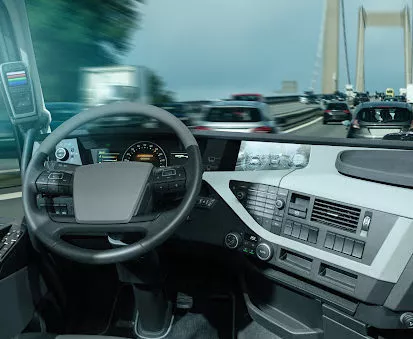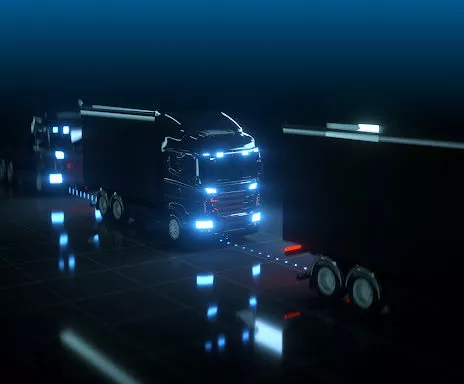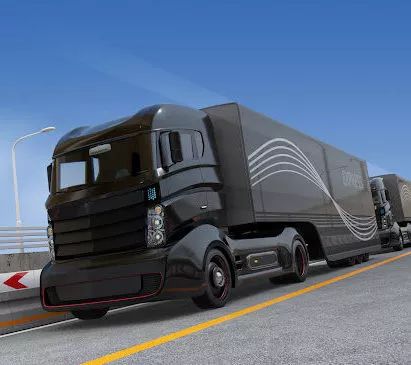Top 6 Companies Making Self-Driving Trucks in 2024

While recent self-driving car offerings from Tesla, GM, Waymo, and the like are getting all the headlines, the autonomous vehicles most likely to be ready for prime time soon are autonomous trucks.
That’s right—within a few years, you could be driving down the highway next to a fully automated tractor-trailer or one that’s part of a caravan of trucks driven by one person at the front.
Of course, driverless vehicles carry major implications for determining liability, dealing with accidents, and other legal and safety concerns.
In fact, safety and legality are two of the top issues keeping self-driving trucks from the following companies dipping into the trucking industry off the road.
Tesla Inc.
In a bold move for the electric vehicle (EV) market, Tesla unveiled the Cybertruck in November 2019. This futuristic, all-electric pickup truck from the Palo Alto, California-based company has the standard self-driving features Tesla has become notorious for and a sharp, triangular stainless-steel body – a major departure from traditional truck designs.
Originally planned for a 2021 launch, the Cybertruck hit a few snags on the road to production but finally started rolling off the assembly line in late 2023.
Tesla isn’t stopping at the Cybertruck when it comes to electric trucks. In late 2022, they began deliveries of the Tesla Semi. However, early reports raised concerns about the Semi’s reliability, with some trucks spotted receiving roadside assistance.
While the Tesla Semi doesn’t currently offer self-driving features, Tesla’s overall safety record has faced scrutiny in the past. This raises questions about the potential safety implications of the Semi, given the significant size and power of commercial vehicles.
Embark
Based in San Francisco, Embark aims to automate trucks on the highway, enabling local drivers to drop their loads off at rest stops and taking over for local deliveries, where traffic is more complex.
This driving technology could change truck driver jobs by allowing them to stay local. Instead of the demanding, cross-country hauls currently required, drivers could focus on routes closer to home. This shift would grant them more time with family and enable them to work more traditional hours.
Embark’s already used its technology to drive a truck across the country, through bad weather, highway transfers, and traffic, all without human assistance. They are also working with Amazon for autonomous deliveries of their massive amounts of packages, reducing their reliance on human drivers.
Embark currently retrofits its self-driving tech to Peterbuilt trucks, and runs a fleet of about a dozen trucks that’s already generating revenue.
Daimler
One of the first automotive companies on the market, Daimler—the parent company of Mercedes-Benz—has also been experimenting with autonomous trucks for quite some time. The Mercedes-Benz Future Truck 2025 uses Highway Pilot, a system that lets the truck drive on highways without any driver assistance.
Daimler trucks use a strategy called platooning to save fuel on cross-country journeys. While in a platoon, trucks drive closely behind one another, cutting down on drag and saving up to 10% of their fuel. As of now, each truck still has a driver for off-highway driving, but Daimler hopes to offer “highly automated driving” within a decade.
Einride

Swedish company Einride builds its own electric trucks without any cab or controls whatsoever, so they’re going all-in on their self-driving tech.
For optimal safety, a human operator can still monitor and remotely control the trucks.
Why remove the cab? It can reduce costs by up to 60% over a conventional truck, claims the company, which is huge in an increasingly-competitive market.
Einride says they’ve signed “large US-based retail companies” for their trucks, but have yet to reveal who those companies are. It now brands itself as a “freight mobility operating system” company.
Waymo
Waymo (a subsidiary of Google’s parent company Alphabet Inc.) is putting more effort into ride-hailing services and less into self-driving trucks. This change shows Waymo’s big interest in the popular ride-hailing market in cities like San Francisco, Phoenix, and Los Angeles.
Originally working on self-driving trucks for moving goods, Waymo is now using its resources to improve its robo-taxi services, aiming to make city travel better. As a result, Waymo’s truck project is paused, and the team is focusing on ride-hailing instead.
The company is still working with Daimler Truck North America on self-driving truck technology, but at a slower pace, and has stopped working with UPS and J.B. Hunt.
Volvo
Swedish scion of safety, Volvo, unveiled its semi-automatic platoon system in 2016. In this system, the lead truck controls the speed and braking of all three trucks in the platoon, which saves time as they all move as one vehicle.
Volvo partnered with shipping giant FedEx in 2018 and is currently prototyping the Vera, a fully autonomous truck without a cab whatsoever. Volvo’s reputation for safety is sure to be an asset in this nascent space.
Risks of Self-driving Trucks
Of course, every new technology comes with its risks. Self-driving vehicles may be smart, but even the calmest roads can become chaotic at the drop of a hat, and navigating busy interstates is a tough challenge, even for seasoned drivers.

It’s only a matter of time until an autonomous truck wrecks into a passenger car, and then a number of legal questions arise:
- Who is legally liable for an autonomous truck wreck? Is it one of the companies making driverless trucks or human error?
- What damages should be awarded, and to whom, in the event of a crash?
- In a self-driving truck accident where the vehicle veers off the road and damages property, who becomes liable for the repairs?
- and more
No matter what the future holds, you need a Louisiana truck accident attorney who has experience with self-driving vehicles who’s ready to face it with you.
Our team of Louisiana personal injury attorneys at Gordon McKernan Injury Attorneys has 679+ years of combined legal experience representing victims of truck wrecks throughout Louisiana, and we’ll be at the forefront of litigating autonomous wrecks, too.

